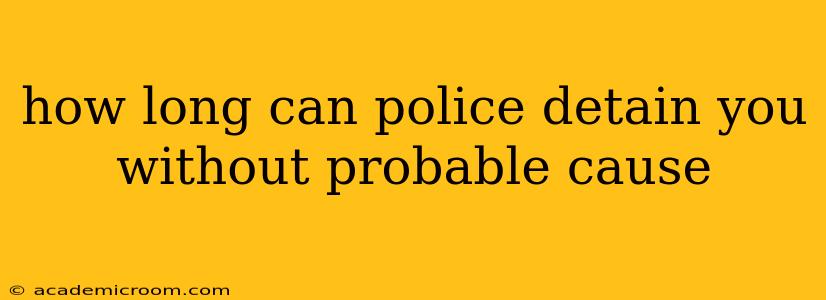The question of how long police can detain you without probable cause is a crucial one, touching upon fundamental rights guaranteed by law. The answer, unfortunately, isn't a simple number. The legality of a detention without probable cause hinges on several factors, primarily the circumstances surrounding the stop and the specific laws of your jurisdiction. This article explores these complexities, aiming to shed light on your rights and what you should do if detained.
What Constitutes a Detention?
Before delving into time limits, it's vital to understand what constitutes a police detention. A detention occurs when a reasonable person wouldn't feel free to leave. This doesn't necessarily require handcuffs or formal arrest. A police officer's commands, their physical presence, or the implication that you're not free to go can all qualify as a detention. A brief, consensual conversation is typically not considered a detention.
How Long is "Too Long"? The Terry Stop
In the United States, a brief detention without probable cause is permissible under the Terry v. Ohio ruling (1968). This allows police to briefly detain a person based on reasonable suspicion—a lower standard than probable cause—to investigate a possible crime. The key here is "brief." A Terry stop must be limited in scope and duration to what's reasonably necessary to investigate the suspicion. Exceeding this timeframe constitutes an unlawful detention.
Determining what constitutes "reasonably necessary" is subjective and often decided in court. Factors considered include:
- The nature of the suspicion: A stronger suspicion may justify a slightly longer stop than a weaker one.
- The actions of the suspect: If the suspect cooperates fully, the stop is likely to be shorter. Conversely, uncooperative behavior may extend the duration.
- The availability of information: If police need to check identification or run a quick background check, the stop may be slightly longer.
It's crucial to remember that a Terry stop is not an arrest. Police still need probable cause for an arrest.
What if the Detention Exceeds the Limits of a Terry Stop?
If police detain you without probable cause for an unreasonable amount of time, the detention is unlawful. The length of time that constitutes "unreasonable" varies by circumstance and jurisdiction, but generally, prolonged detentions without probable cause or reasonable suspicion are violations of your Fourth Amendment rights (protection against unreasonable searches and seizures).
What to Do if You Believe You Are Being Unlawfully Detained
If you believe you are being unlawfully detained, you should:
- Remain calm and polite: This doesn't mean you have to agree with the detention; simply avoid escalating the situation.
- Clearly state that you do not consent to the search: Police can't search you without consent, probable cause, or a warrant.
- Ask if you're free to leave: This clarifies the nature of the interaction. If they say no, you're detained.
- Ask for the reason for the detention: Understanding their justification is important.
- Know your rights: Familiarize yourself with your rights before any interaction with law enforcement.
- Document the encounter: If possible, discreetly record the interaction (check local laws regarding recording police).
- Seek legal counsel: Contact a lawyer if you believe your rights have been violated.
How Long Can Police Hold You Without Charging You?
This is separate from the question of detention without probable cause. After an arrest, police can hold you for a limited time before formally charging you. This time limit varies by jurisdiction and the seriousness of the alleged crime. However, prolonged pre-charge detention without sufficient cause is also a violation of your rights.
Can Police Detain You Based on a Tip?
Police can act on tips, but the tip must be credible and provide sufficient reasonable suspicion for a temporary detention. An anonymous tip alone is usually insufficient; it typically needs corroboration or other evidence to justify a detention.
This information is for educational purposes and does not constitute legal advice. If you have specific legal questions, consult with an attorney. The specifics of detention laws vary by location and circumstances. Knowing your rights and remaining calm are essential during any police interaction.
